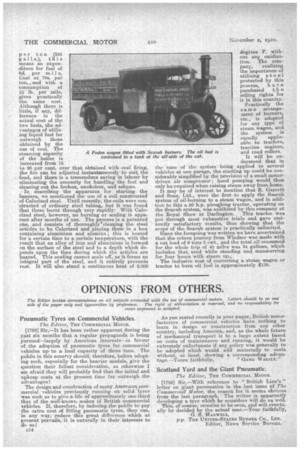OPINIONS FROM OTHERS.
Page 12

If you've noticed an error in this article please click here to report it so we can fix it.
The Editor incites correspondence on all subjects connected with the use of commercial motors. Letters should be on one side of the paper wily and typewritten by preference. The right of abbreviation is reserved, and no responsibility for views expressed as accepted.
Pneumatic Tyres on Commercial Vehicles,
The Editor, THE COMMERCIAL MOTOR.
[1758] Sir,—It has been rather apparent during the past six months that a regular propaganda is being pursued—largely by American interests—in favour of the adoption of pneumatic tyres for commercial vehicles up to a load capacity of three tons. The public in this country should, therefore before adopting such, especially for the heavier models, give the question their fullest consideration, as otherwise I am afraid .they will probably find that the initial and upkeep costs at the Present time far outweigh the advantages I
The design and construction of many Anaerican commercial vehicles previously running on solid 'tyres was such as to give a life of approximately one-third that of the well-known makes of British commercial vehicles. If, therefore, by inducing the public to pay the extra cost of fitting pneumatic tyres, they can, in any way, reduce this great difference which at present prevails, it is naturally in their interests to do so I
el4 As you stated recently in your paper, British manufacturers of commercial vehicles have nothing to learn in design or .construction from any other country, including America, and, as the whole future of mechanical transport is to a large extent based on costs of maintenance and running, it would be extremely unfortunate if any policy was generally to be adopted which would add materially to costs without, at least, showing a corresponding advan tage.—Yours faithfully, " GANG WARILY."
Scotland Yard and the Giant Pneumatic.
The Editor, THE COMMERCIAL MOTOR.
[1759] Sir,—With reference to " British Lien's" letter on giant pneumatics in the last issue of The Commercial Motor, the reason for it seems obvious from the last paragraph. The writer is apparently developing a tyre which he considers will do as well.
This, of course, remains to be seen, and will eventually be decided by the actual user.—Your faithfully, G. S.. MAXWELL,
p.p. THE UNITED., STATES RUBBER Co., Editor, News Service Bureau.


























































